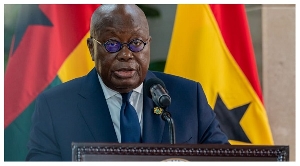General News of Tuesday, 25 August 2020
Source: GNA
CSOs urge government to reject support from tobacco industry
The Institute of Leadership and Development (INSLA), a civil society organization has called on the Government to reject any support from the tobacco industry and its affiliates in the management, control, and treatment of COVID-19 in Ghana.
It also urged the Government to boldly place a temporary ban on the sales and use of tobacco products pending the find of a vaccine or sustainable treatment of the Covid-19 while investing in the implementation of the Tobacco Control Measures of the Public Health Act 851 of 2012.
The INSLA, a member of the African Tobacco Control Alliance (ATCA) and their partners made the call at a news conference in Accra on the theme: “Reject any Support from the Tobacco Industry.”
Mr Benjamin Anabila, the Director of INSLA who addressed the conference said tobacco smoking was a known and proven risk fact for many respiratory infections and increases the severity of respiratory diseases.
“A review of studies by public health experts convened by the World Health Organisation (WHO) on April 29, 2020, found that smokers are more likely to develop severe disease with Covid-19, compared to non-smokers,” he said.
Mr Anabila said tobacco is a major risk factor for non-communicable diseases (NCDs) like cardiovascular disease, cancer, respiratory disease, and diabetes and people with these conditions were at higher risk of developing severe complications if they became infected with the coronavirus.
“The tobacco industry is fully aware of the devastating consequences of its products, yet it invests heavily around the world to create a favourable environment for its business, even when it is clear that this puts many lives at risk,” he said.
The Director said in a way to sway authorities and the public from the negative image of its products, the tobacco industry had engaged in humanitarian gestures like the offering of financial donations and life-saving equipment including ventilators, hand sanitizers, and face marks to governments.
“Such gestures have been identified in countries like Uganda and Zambia, and the tobacco industry continues to use it to clean its image in the continent. It is usually aimed at putting governments at a tight end with regards to the implementation of tobacco control and public health policies in the future,” Mr Anabila said.
He said: “The tobacco industry engages in this activity to portray itself as a responsible entity which cares for the well-being of COVID-19 patients when in effect, its products only help to aggravate their situation.”
Mr Anabila said historically, the tobacco industry and its allies have engaged in such Corporate Social Responsibility (CSR) initiatives to give the impression that it is a development partner and a stakeholder when its product kills eight million people around the world annually.
“WHO Framework Convention on Tobacco Control to which Ghana is a party and Schedule (2) OF Ghana’s Public Health Act 851 requires that governments reject any form of sponsorship including CSR of the tobacco industry,” he said.
He said the Spanish Region of Galicia has completely banned smoking over COVID-19 risk and in April 2020 South Africa also placed a ban on the sales of tobacco as measures to reduce the spread of the COVID-19.













